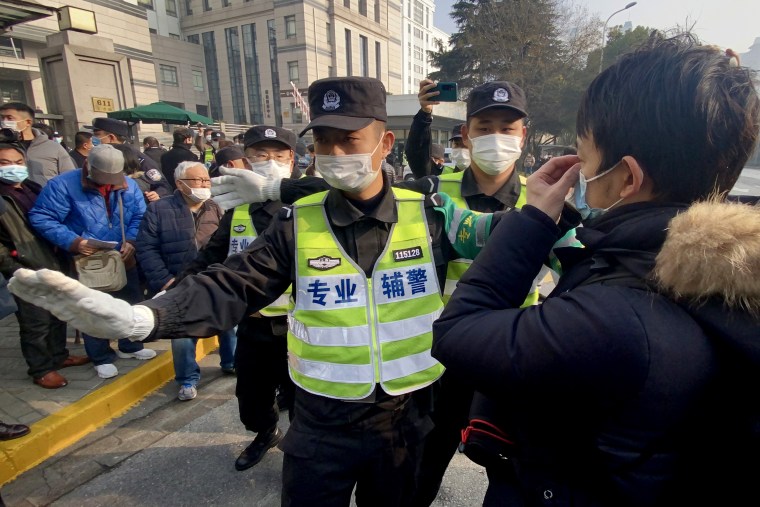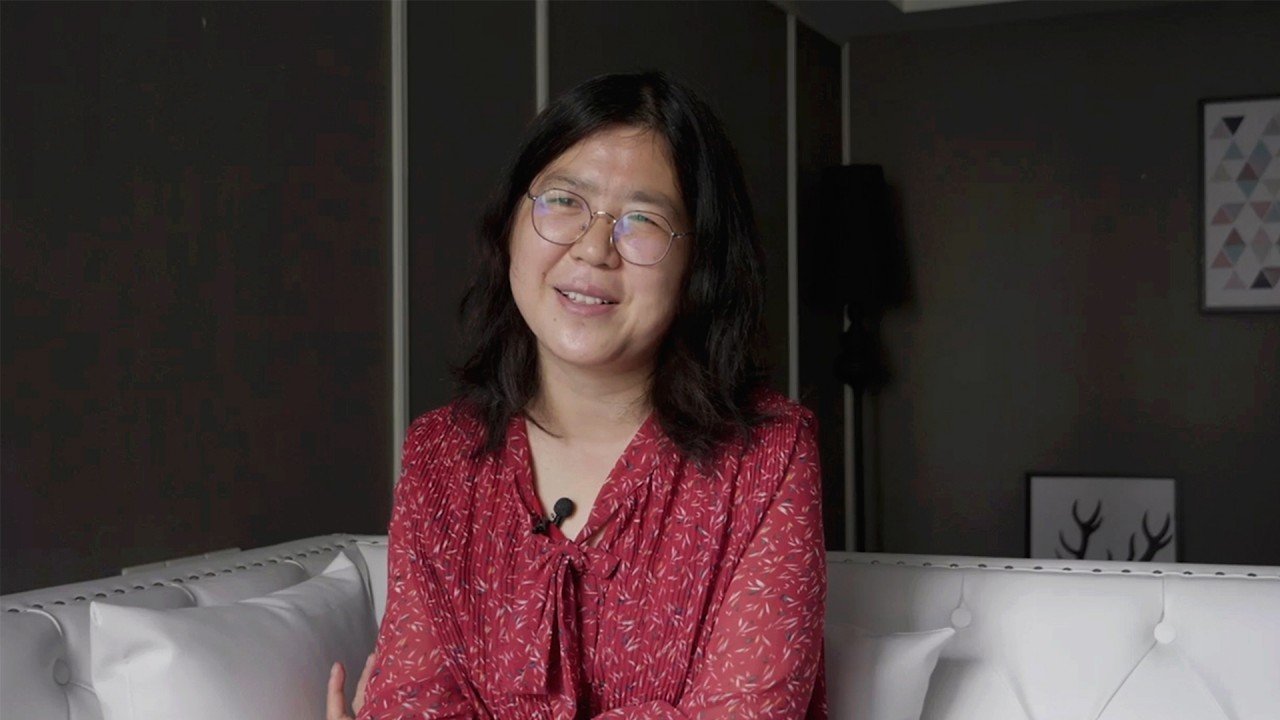Zhang Zhan began an intermittent hunger strike after her arrest in May 2020. Rights groups say she has been force-fed and kept in restraints.
It was dark as Zhang Zhan walked along with the building in Wuhan, China, a constant, dull roar in the background.
“It’s 12:40 a.m. The sound of the funeral home’s crematorium,” she said in the February 2020 video, one of the dozens she posted on YouTube. “They work day and night.”
In the early days of the coronavirus pandemic, when the Chinese government was trying to contain the initial outbreak, reporting by citizen journalists like Zhang questioned the scale of the crisis and the government’s response. But they worried their aggressive reporting wouldn’t be tolerated for long in a country where the news media is strictly controlled.
“At the moment it’s OK,” Zhang said of her critical coverage in a May 2020 interview with an independent filmmaker, which was shared with NBC News. “They didn’t arrest me. However, if I continue with this, I don’t know their bottom line.”
Zhang went missing that month. Her lawyer later confirmed to NBC News that she had been convicted the following December of “picking quarrels and provoking trouble,” by a court in Shanghai where she was jailed for four years.

She is one of at least 10 journalists and commentators who early on tried to force Chinese authorities to be more transparent about the impact of the virus and were silenced by officials struggling to contain news of the pandemic. Though many others have since been released, Zhang is in prison, and her family, friends and supporters fear she could die from the hunger strike she is staging in protest.
“She stands for the truth, and she stands for justice,” Jane Wang, U.K.-based activist campaigning for Zhang’s release, told NBC News. “And she represents the very best of China.”
Zhang’s brother, Zhang Ju, said on Twitter in October that his sister weighed less than 90 pounds.
“She may not survive the coming cold winter,” he said.
In a statement, the Chinese Embassy in Britain said careful attention was paid to the health of prison inmates and that their right to receive medical attention was “fully guaranteed.”
“The rights of Chinese citizens are protected in accordance with the law,” it said. “Everyone is equal before the law, and anyone who breaches the law shall be sanctioned accordingly.”
Zhang, 38, is one of at least 127 professional and citizen journalists detained in China, more than anywhere else in the world, according to a report this month by nonprofit group Reporters Without Borders. A separate report released this month by the Committee to Protect Journalists also singled out China as the world’s biggest jailer of journalists.
The Chinese government has been criticized over its actions early in the pandemic when eight doctors who tried to warn others about the virus were reprimanded by Wuhan police for “spreading rumors.” The doctors were vindicated by China’s top court shortly before one of them, Dr. Li Wenliang, 34, died of Covid-19.
Beijing is under growing pressure to reveal what it knows about the pandemic’s origins amid renewed questions about whether the virus spread from a laboratory in Wuhan, a theory that Zhang explored in her reporting. China has dismissed the theory as a “conspiracy” and said international experts have “repeatedly praised China’s open and transparent attitude” when it comes to the virus.
Were she to die, Zhang would not be the first Chinese dissident to perish in custody; others include Liu Xiaobo, the pro-democracy icon and Nobel Peace Prize laureate who died of liver cancer in 2017 while serving an 11-year prison term.
Download the NBC News app for full coverage of the coronavirus outbreak
Last month, the U.S. State Department expressed concern over Zhang’s deteriorating health and called for her release.
“We have repeatedly expressed our serious concerns about the arbitrary nature of her detention and her mistreatment during it,” spokesperson Ned Price said Nov. 10.
The United Nations has also called for Zhang’s “immediate and unconditional” release. Last month, she was awarded the Reporters Without Borders Prize for Courage.
Wuhan residents remember ‘whistleblower’ doctor one year after his death
Zhang, a former lawyer, was already known to Chinese authorities before her reporting on the coronavirus. In September 2019, as pro-democracy protests roiled the Chinese territory of Hong Kong, she displayed an umbrella in downtown Shanghai that called for an end to the Communist Party’s monopoly on power. Authorities detained her for more than two months, during which time she went on a hunger strike.
She was released in November that year, weeks before the first cases of the coronavirus were detected in Wuhan, a central Chinese city. Seeking to stop further spread of the virus, the Chinese government placed Wuhan and its 11 million residents on lockdown Jan. 23, 2020. The lockdown, the first of its kind in the world, would last 76 days.
blame?
Zhang arrived in Wuhan in early February, unsure at first as to her purpose.
“I really didn’t know anything medical,” she said in the May 2020 interview. “I just followed my heart.”
Soon, she was publishing articles and videos online about life under lockdown and the difficulties it created for residents. Zhang said she wanted to speak up for those who were struggling economically or who were not allowed to mourn loved ones lost to Covid-19.
“They are already burdened with death, and now they are oppressed,” she said in one video.
She also made multiple visits to the Wuhan Institute of Virology, which has come under scrutiny as a possible source of the virus — a claim denied by the institution. Addressing the accusations for the first time in April 2020, Yuan Zhiming, the institute’s vice director, told Chinese state broadcaster CGTN that they were designed to “confuse” people.
But in one video filmed outside the lab, Zhang said: “We can find the truth of the virus’s origin with patience and tenacity.”
In the course of her reporting, Zhang documented confrontations with officials; she told friends she was being followed by police and warned to stop what she was doing.
“We are talking about a female human rights defender who took all the risk, all the risk in the world, to go to the most dangerous place to find the truth for all of us,” Wang said.
She was subsequently imprisoned for “picking quarrels and provoking trouble,” a vaguely defined crime that is often used to silence critics of the government.
“Zhang Zhan is a victim of the Chinese government’s zero-tolerance approach to criticism and opposing views,” Gwen Lee, China campaigner at Amnesty International, said in a statement last month.
A second citizen journalist who reported from Wuhan early in the pandemic, Fang Bin, is also still being detained, Reporters Without Borders said.
Zhang began an intermittent hunger strike after her arrest in May 2020. Rights groups say she has been force-fed and kept in restraints. In the summer, she was hospitalized for 11 days, and her family was told she could die.
Wang said Zhang’s mother had last seen her on a video call in late October and “cried for hours and hours” after seeing her daughter “on the verge of death.”
“She couldn’t walk,” Wang said of Zhang’s condition during the call. “She couldn’t even hold her head up herself.”
Zhang’s family has applied for her release on medical parole, but her mother told the South China Morning Post there has been no response. Wang said she believes Zhang is prepared to die in prison unless she is released.
“Zhang Zhan would not tolerate any other way,” she said.
Wang said Zhang had persisted in her hunger strike “because she believes she’s innocent. She believes that she has a right to see the truth and speak the truth.”
Get the Morning Rundown


